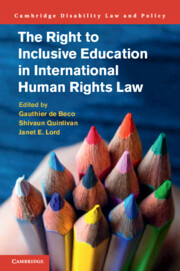Book contents
- The Right to Inclusive Education in International Human Rights Law
- Cambridge Disability Law and Policy Series
- The Right to Inclusive Education in International Human Rights Law
- Copyright page
- Contents
- Notes on Contributors
- Acknowledgements
- Preface by Theresia Degener
- The Arthur Cox Foundation
- 1 Introduction
- Part I Background
- Part II Theoretical Foundations
- Part III Implementation
- Part IV Practice
- 19 Litigating the Right to Inclusive Education under Irish Law
- 20 Inclusive Education in Flanders, Belgium
- 21 The Implementation of the Right to Inclusive Education in Germany
- 22 The Past, Present and Future of the Right to Inclusive Education in Italy
- 23 Inclusive Education in China
- 24 Legislating Inclusive Education in the Era of the CRPD
- 25 Implementation of the Human Right to Inclusive Education in Japan
- 26 Charting a Legal Course towards the Inclusion of Children with Disabilities in Tajikistan
- 27 The Right to Inclusive Education in Argentina
- Index
26 - Charting a Legal Course towards the Inclusion of Children with Disabilities in Tajikistan
from Part IV - Practice
Published online by Cambridge University Press: 15 April 2019
- The Right to Inclusive Education in International Human Rights Law
- Cambridge Disability Law and Policy Series
- The Right to Inclusive Education in International Human Rights Law
- Copyright page
- Contents
- Notes on Contributors
- Acknowledgements
- Preface by Theresia Degener
- The Arthur Cox Foundation
- 1 Introduction
- Part I Background
- Part II Theoretical Foundations
- Part III Implementation
- Part IV Practice
- 19 Litigating the Right to Inclusive Education under Irish Law
- 20 Inclusive Education in Flanders, Belgium
- 21 The Implementation of the Right to Inclusive Education in Germany
- 22 The Past, Present and Future of the Right to Inclusive Education in Italy
- 23 Inclusive Education in China
- 24 Legislating Inclusive Education in the Era of the CRPD
- 25 Implementation of the Human Right to Inclusive Education in Japan
- 26 Charting a Legal Course towards the Inclusion of Children with Disabilities in Tajikistan
- 27 The Right to Inclusive Education in Argentina
- Index
Summary
- Type
- Chapter
- Information
- Publisher: Cambridge University PressPrint publication year: 2019



